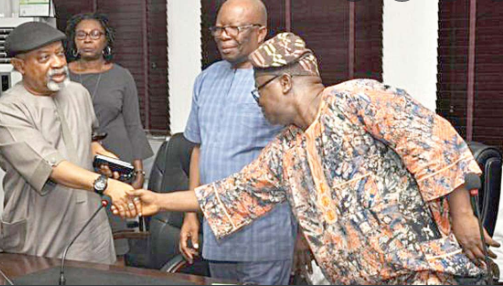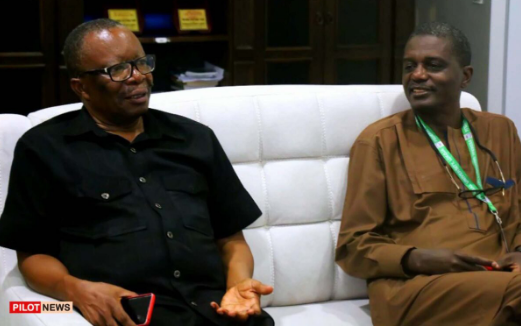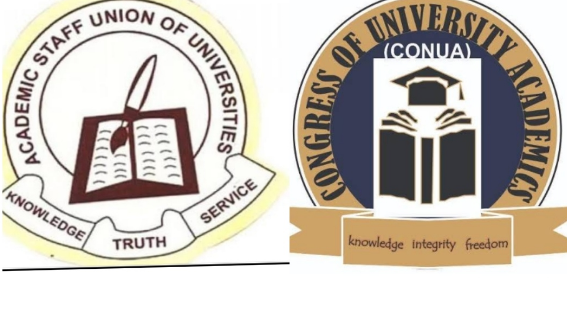Statistics And History of Asuu Strike Over The Years
Statistics And History of Asuu Strike Over The Years.
In This Review

The Academic Staff Union of Universities (ASUU) is a Nigerian union of university academic staff, founded in 1978. ASUU is an offshoot of the Nigerian Association of University Teachers (NAUT) which was established in 1965. At that time, NAUT consisted of only five universities in total including the University of Ibadan, the University of Nigeria, Nsukka, Ahmadu Bello University, Zaria, the University of Ife, and the University of Lagos. Professor Victor Emmanuel Osodeke emerged as the body’s president on 30 May 2021.
A lot of schools are currently under ASUU both Federal and State Universities and would be affected by any strike the union decides to embark on.
After 234 days (33 weeks) of strike action by ASUU, the Federal Government of Nigeria on Thursday, October 05, 2022, announced the formation of two new academic unions – the National Association of Medical and Dental Academics (NAMDA) and the Congress of Nigerian University Academics (CONUA).
Foundation
As a successor to the Nigerian Association of University Teachers which was founded in 1965, ASUU was formed in 1978 to cater to the interests of all academic staff in Federal and State universities in Nigeria.
Although ASUU consists of many universities, there are several other universities that are not under ASUU as the body. These universities include the following and all private universities in Nigeria.
- Federal University located in Nsukka, Enugu State, Nigeria
- The Federal University of Ilorin, also known as Unilorin
- Delta State University, Abraka – popularly known as DELSU
Leadership of ASUU
Professor Osodeke, a professor of Soil Science, at the Federal University of Agriculture, Umudike, Abia State, was elected on 30th May 2021 during a three-day conference of the union held at the Nnamdi Azikiwe University, Awka, Anambra State.

He took over from Biodun Ogunyemi, a professor of education at the Olabisi Onabanjo University, Ago-Iwoye, Ogun State.
ASUU strikes
Military regime
The Union was active in struggles against the military regime during the 1980s. In 1988 the union organized a National Strike to obtain fair wages and university autonomy. As a result, the ASUU was proscribed on 7 August 1988 and all its property was seized. It was allowed to resume in 1990, but another strike was again banned on 23 August 1992. However, an agreement was reached on 3 September 1992 that met several of the union’s demands including the right of workers to collective bargaining. The ASUU organized further strikes in 1994 and 1996, protesting against the dismissal of staff by the Sani Abacha military regime.
Fourth Republic
After the return to democracy in 1999 with the Nigerian Fourth Republic, the union continued to be firm in demanding the rights of university workers against opposition by the government of President Olusegun Obasanjo. In July 2002 Dr. Oladipo Fashina, the then-national president of the union, petitioned Justice Mustapha Akanbi of the Independent Corrupt Practices Commission to investigate the authorities of the University of Ilorin for financial mismanagement and corruption.
In 2007, the ASUU went on strike for three months. In May 2008, it held two one-week “warning strikes” to press a range of demands, including an improved salary scheme and reinstatement of 49 lecturers who were dismissed many years earlier. In June 2009, ASUU ordered its members in federal and state universities nationwide to proceed on an indefinite strike over disagreements with the Federal Government on an agreement it reached with the union about two and a half years earlier. After three months of strikes, in October 2009, the union and other staff unions signed a memorandum of understanding with the government and called off the industrial action. On 1 July 2013, ASUU embarked on another strike which lasted 5 months, and 15 days was called off on 16 December 2013. Claims made by ASUU in regard to the strike are centered largely on funding and revitalization of Nigerian public universities as well as a certainly earned allowance which it claims to be in arrears of 92 billion naira. Some Nigerian students said that the strike was a curse to them while others said it was a blessing before the ASUU strike was called.
In 2022, ASUU declared a one-month strike, beginning February 14, 2022. Some of the lecturer’s demands include the revitalization of public universities, earned allowance, improved funding of state universities, and promotion arrears. On March 7, 2022, Minister of Education, Adamu Adamu inaugurated a committee to renegotiate the 2009 agreement with ASUU. The seven-man panel has Prof. Emeritus Nimi Briggs, Pro-Chancellor of Alex Ekwueme Federal University (AEFU), Ndufu-Alike Ikwo, as chairman. On March 14, ASUU extended the strike by 8 more weeks. The Federal Government eventually met ASUU on April 11, 2022, exactly 56 days after the commencement of the strike. On May 9, ASUU extended the strike by additional 12 weeks, and the strike reached six months without resolution, making it one of the longest ASUU strikes in history. On August 1, 2022, ASUU extended the strike by another four weeks. The FG met ASUU on August 16, 2022, to continue negotiations, with ASUU promising to suspend the strike if its demands were met, but the meeting ended in a deadlock. ASUU subsequently said it would begin consultation on the next line of action. ASUU local chapters at ABU, BUK, UDUS, and OAU voted for continuation and declaration of an indefinite strike in response to the government’s offer. State universities such as Benue State University, TASUED, Adekunle Ajasin University, Kano State University of Technology have also insisted on prosecuting the strike to its logical conclusion.
ASUU strike chart (1999–2022)
| s/n | Year | Duration |
|---|---|---|
| 1 | 1999 | 5 months |
| 2 | 2001 | 3 months |
| 3 | 2002 | 2 weeks |
| 4 | 2003 | 6 months |
| 5 | 2005 | 2 weeks |
| 6 | 2006 | 3 days |
| 7 | 2007 | 3 months |
| 8 | 2008 | 1 week |
| 9 | 2009 | 4 months |
| 10 | 2010 | 5 months |
| 11 | 2011 | 59 days |
| 12 | 2013 | 5 months |
| 13 | 2017 | 1 month |
| 14 | 2018 | 3 months |
| 15 | 2020 | 9 months |
| 16 | 2022 | February 14, 2022 – present (7 months and counting |
Origin of incessant strikes
These strikes are in response to the Nigerian Government’s refusal to uphold the agreement signed. It is a move by the union to force the government into a response. However, this has only yielded negative results.
Impact of strikes on students and stakeholders
While the association continues to claim that it is involved in a struggle for Nigerian tertiary education and Nigerian students by extension, many Nigerians perceive the supposed struggle, marked by incessant strike actions, to be malicious and self-serving. This image has not been helped by ASUU, who still cannot communicate effectively with the Nigerian populace without sounding arrogant and condescending.
CONUA’s Intervention and Meaning

What is my proposal? Cut down administrative costs by pruning dozens of our federal universities into 12 universities with two in each of the geopolitical zones. If you do that, the university system will save close to 37% of its total operating budget. When that happens, even with no new funds from the largely empty national treasury, the schools will have spare cash to run operations.
Of course, this has zero chance because ASUU members want to be vice-chancellors, deans, etc. But if they visit Rwanda, they will see that schools can magically have “more funds” through reorganization.
Rwanda copied the University of California system. In that system, one person oversees UC’s world-renowned university system of 10 universities, five medical schools, three nationally affiliated labs, more than 280,000 students, and 230,000 faculty and staff. Most of those universities are ranked in the top 50 in the world: UC Berkeley, UC Davis, UC Irvine, UCLA, UC Merced, UC Riverside, UC San Diego, UC San Francisco, etc.
Run the numbers – one person is managing 280k students which is basically 50% of the total enrollment in the Nigerian university system. The total public university capacity in Nigeria is less than 1.5 million students but you have more than 100 vice chancellors translating to an average of 15k students per chancellor!
As the controversy between the federal government and the Academic Staff Union of Universities (ASUU) nears its eighth month, the government has moved to replace the union with its breakaway faction.
Daily Trust reports that Congress of Nigerian University Academics (CONUA), a breakaway faction of ASUU, has been officially registered as a trade union in a move to reopen academic activities in public universities.
According to the report, a source at the Ministry of Labour and Employment had revealed on Tuesday, that the Minister of Labour and Employment, Chris Ngige, will present a Certificate of Registration to the new union before the end of the day.
In Southeast, FUTO can be the engineering campus for UNN with no Vice-Chancellor, pro-chancellor, etc but just a Dean or provost. The Fed Agriculture Umudike becomes the Agric School of UNN. Like in the California system which Rwanda copied, you end up having just two vice-chancellors who will run all the federal universities in SE. You save costs on cars, housing, etc and those will go into real learning. Interestingly, like in the California system, you increase enrollment. Think about it, if Amazon has one CFO (chief financial officer) to serve more than 1 million workers, why should each university have a bursar when 1-2 can handle it per geopolitical region?
A Middle Man’s Proposed Solution To Education Crisis In Nigeria
We run the university education here the same way we run petrol subsidy, and both are delivering similar outcomes.
It is not about talking or making suggestions, but we first need to ask if we need universities fully funded by the government, if the answer is yes, the next question will be, how many of them? Answering the second question must be premised on how much will be available and where the funds will be coming from.
Even if you make ASUU president the president of Nigeria, I can tell you that he won’t be able to fund the universities, but in the spirit of activism, everyone seems to be making sense.
Neither the government nor ASUU has a credible solution to the current malaise because whatever patch either provides today, the same malady will return within two years.
It’s a number thing, and all the yammerings have not shown that there’s a vault where all the money needed to consistently and sustainably fund these universities is sitting.
It’s either we run proper universities or we restrict our funding to basic education, anything else is delusional.
You cannot have lazy people both in government and academics and somewhat expect wonders. In matters of revenue and efficient administration, both are mediocre.


![[People Profile] All We Know About Sophia Muhammed Biography: Age, Career, Spouse, Family, Net Worth](https://glamcodemedia.com/wp-content/uploads/2022/10/sophia-294x300.png)